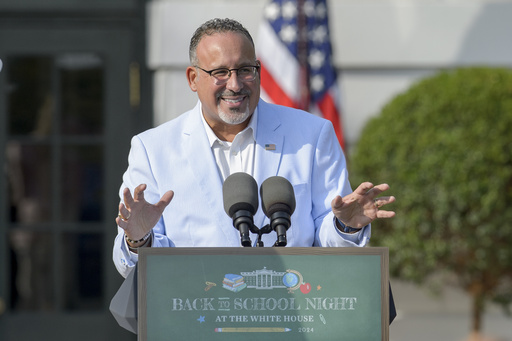WASHINGTON — As Republican-led states strive to restrict school history curricula and enforce bans on transgender athletes, Education Secretary Miguel Cardona emphasizes focusing on significant educational initiatives instead. In a recent interview, Cardona expressed his dedication to enhancing student support by increasing the presence of social workers in schools, expanding summer education programs, and fostering a new generation of educators.
During his time at the helm, Cardona aimed to distance himself from the political skirmishes instigated by certain Republican governors, whom he believes are merely seeking attention. “I refuse to be sidetracked by cultural skirmishes,” Cardona stated. “This is frivolous, and those who engage in it do so at their own detriment.” He prefers to be remembered for substantial actions rather than sensational headlines. Cardona highlights his role in facilitating school reopenings post-COVID-19, overseeing a significant influx of federal funding to assist schools, and his involvement in the cancellation of student loans for over 5 million Americans.
However, Cardona’s term will also be remembered for the political challenges that infiltrated the education sector. Critics argue that the reopening of schools during the pandemic was slower than necessary, contributing to ongoing academic deficits and worsened youth mental health issues. Following the pandemic, education became a contentious issue, with conservatives focusing on eliminating what they perceive as excessively progressive ideologies in classrooms. In response, Republican-led states enacted laws restricting discussions surrounding race and sexuality while banning transgender athletes from participating in school sports.
Some conservatives view Cardona as championing a political agenda within education. He entered disputes with conservative governors over mask mandates and voiced strong opposition to attacks on diversity initiatives in schools, condemning attempts to “whitewash history.” His attempt to broaden Title IX protections to include LGBTQ+ students faced immediate resistance, resulting in pushback from states with conservative leadership.
Cardona’s initiatives sought to safeguard the rights of marginalized students. Nevertheless, he encountered challenges in execution, as a federal ruling nullified the revised Title IX regulation. Additionally, states led by Republican officials largely disregarded his calls for promoting diversity within educational settings. A poll indicated that a majority of voters nationally felt that support for transgender rights had become excessive in society and governance. “We have observed a regression in student rights within the nation,” Cardona remarked, acknowledging the constraints the federal government faces concerning state policies.
Cardona, 49, rose rapidly within the education sector, beginning his career as a fourth-grade teacher before ascending to roles as a principal and district administrator, ultimately serving as Connecticut’s education chief. Biden’s administration emphasized appointing a leader with real teaching experience, contrasting with Betsy DeVos, Trump’s first education secretary.
At the inception of his term, Cardona endeavored to unify Republican governors. By addressing issues like mask mandates and testing through correspondence, he aimed to foster cooperation. Ultimately, he reassessed this approach, believing that some governors were eager to leverage these conflicts for national attention ahead of the upcoming presidential elections.
In response to Cardona’s critiques, Florida Governor Ron DeSantis’s office downplayed his statements, arguing that the Republican focus on parental involvement significantly influenced their recent electoral successes. “Our objective is education, not indoctrination,” DeSantis stated, asserting that Biden’s administration promotes an agenda that imposes what schools should teach.
Political tensions soon spilled into the judiciary, where Republican states successfully challenged various aspects of Biden’s signature education proposals, such as widespread student loan relief and the expansion of Title IX. Further, certain initiatives faltered due to a lack of bipartisan support in Congress, particularly a proposal for free community college.
Despite this, Cardona remains optimistic about the accomplishments achieved during his tenure. Under Biden’s leadership, significant increases in Pell Grants for low-income students occurred, impacting access to education. Over a million public service workers benefited from student loan forgiveness, and new legislation allowed for the hiring of thousands of mental health professionals in schools. “Our efforts will yield significant benefits for a vast number of students,” he underscored.
One of the more challenging aspects of Cardona’s leadership was the problematic overhaul of the FAFSA financial aid process. Although Congress mandated simplification of the extensive and confusing application form, a series of technological issues resulted in prolonged delays for financial aid decisions, prompting critics to declare a crisis. Cardona contested this view, pointing to new data indicating an increase in college freshman enrollment for the fall semester, describing the FAFSA updates as a challenging period that tested their resilience.
In his farewell address, Cardona encouraged his colleagues to maintain hope amid uncertainties regarding potential policy reversals in the next administration. He expressed confidence in the American educators and students who will ultimately shape the future of public education, stating, “No single education secretary or president determines the course; it is the will of our teachers and students that prevail.”




